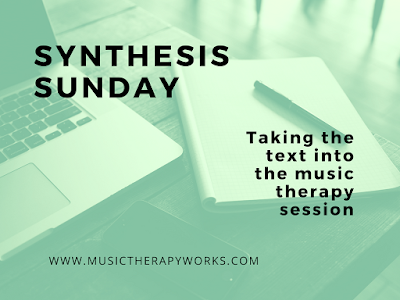Synthesis Sunday: Getting Back Into the Routine
This post was actually ready last week, but I had a migraine so working on the computer was completely out! I am getting myself back into the habit of reading research and making clinical inferences for my own clinical practice.
For this week, I chose an article from the Music Therapy Perspectives, volume 34, number 2, published in 2016. Michael Viega wrote an account describing Hip Hop as a musical genre as well as a culture and a way of thinking about the world. (The full citation is at the beginning of the R-I Worksheet contained in this post.)
The article gave me a glimpse into parts of Hip Hop that I have never really considered or even been aware of during my time working with adolescents. There are significant differences between the terms, hip-hop, Hip Hop, and Hiphop. Read these definitions on page 138.
Here is my worksheet model.
For this week, I chose an article from the Music Therapy Perspectives, volume 34, number 2, published in 2016. Michael Viega wrote an account describing Hip Hop as a musical genre as well as a culture and a way of thinking about the world. (The full citation is at the beginning of the R-I Worksheet contained in this post.)
The article gave me a glimpse into parts of Hip Hop that I have never really considered or even been aware of during my time working with adolescents. There are significant differences between the terms, hip-hop, Hip Hop, and Hiphop. Read these definitions on page 138.
Here is my worksheet model.
Article Reference: Viega, M. (2016). Exploring the discourse in Hip Hop and implications for music therapy practice. Music Therapy Perspectives, 34(2), p. 138-146.
|
Additional References:
Aigen, 2014, p.33
Aigen, 2009
|
Definitions:
bricologe
|
|
Theory/Philosophy:
"hip-hop - commercial product"; "Hip Hop - cultural engagement with the artistic and stylistic elements of rap"; "Hiphop - spiritual and creative force from which Hip Hop culture and its refinitions were born." p. 138
"need for music therapists to know cultural aspects and then link their study to specific interventions used in music therapy." p. 139
Ghetto Brothers - made music to replace violence which led to an increase in creative expression rather than violence - power of the spoken word (came from West African oral tradition) p. 141
Development - Bronx, New York City, NY and Trenchtown, Jamaica - early 1970's - increase in "youth gangs" - parallel emergence of music in two areas of the world was probably affected by immigration from Jamaica to the Bronx - DJ Kool Herc/Afrika Bambaataa/King Tubby/Lee "Scratch" Perry - these DJs started to make music taking music already present, adding musical elements, and mixing music into reflections of street life. p. 141
|
|
|
Quotations:
"When the creation of music becomes a legitimate, self-justifying clinical activity, any roles that the therapist must assume to achieve this goal are not only legitimate, but also required." Aigen (2014, p.33) p. 139
"Aigen (2009) asserts that 'the ability to connect the specific properties of one's means of intervention to a specific outcome is an essential aspect of a modern approach to healthcare.' " p. 240
|
Takeaways for My Practice:
Increased my awareness of my first-world privilege and inability to be fully part of the Hip Hop culture. Illustrated that I really don't know much about this culture at all.
My clients may not be able to understand the cultural ramifications and elements illustrated in the article. It would be important for me to understand more about the ideas and aspects behind the music, but I'm not sure if there are many other takeaways for my client population.
|
Additional Thoughts: This may be an interesting topic for more study. I wonder if I could do something where I contrast the cultural aspects of others musical genres in a historical manner - looking at the culture of different genres. I bet others have done that, so I shouldn't have to reinvent the wheel in this discussion. I think this would be an interesting course. Hmm.


Comments
Post a Comment